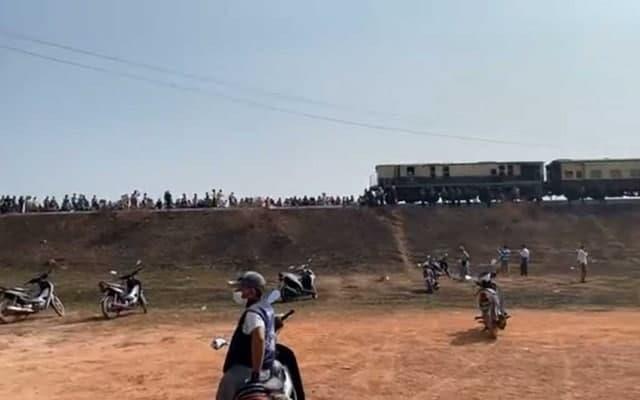YANGON, Feb. 16 (Reuters) - Protesters opposed to Myanmar’s military coup blocked train services between Yangon and a southern city on Tuesday, hours after a U.N. envoy warned the army of “severe consequences” for any harsh response to the pro-democracy demonstrations.
Despite the deployment of armoured vehicles and soldiers in some major cities on the weekend, protesters have kept up their campaign to denounce the Feb. 1 takeover and demand the release of detained leader Aung San Suu Kyi and others.
As well as the demonstrations in towns and cities across the ethnically diverse country, a civil disobedience movement has brought strikes that are crippling many functions of government.
Protesters milled onto a sun-baked stretch of railway track waving placards in support of the disobedience movement, stopping the service between Yangon and the southern city of Mawlamyine, live images broadcast by media showed.
“Release our leaders immediately,” and “People’s power, give it back,” the crowd chanted.
Crowds also gathered in two places in the main city of Yangon - at a traditional protest site near the main university campus and at the central bank, where protesters hoped to press staff to join the civil disobedience movement.
About 30 Buddhist monks protested against the coup with prayers.
The turnout at protests this week has been smaller than the hundreds of thousands who joined earlier demonstrations, but opposition to the army takeover that halted a decade of unsteady transition to democracy remains widespread.
The army cut off the internet for a second consecutive night early on Tuesday though it was again restored at about 9 a.m. (0230 GMT)
U.N. Special Envoy Christine Schraner Burgener spoke on Monday to the deputy head of the junta in what has become a rare channel of communication between the army and the outside world, urging restraint and the restoration of communications.
“Ms Schraner Burgener has reinforced that the right of peaceful assembly must fully be respected and that demonstrators are not subjected to reprisals,” U.N. spokesman Farhan Haq said at the United Nations.
“She has conveyed to the Myanmar military that the world is watching closely, and any form of heavy-handed response is likely to have severe consequences.”
In an account of the meeting, Myanmar’s army said junta Number Two, Soe Win, had discussed the administration’s plans and information on “the true situation of what’s happening in Myanmar”.
The unrest has revived memories of bloody outbreaks of opposition to almost half a century of direct army rule that ended in 2011 when the military began a process of withdrawing from civilian politics.
